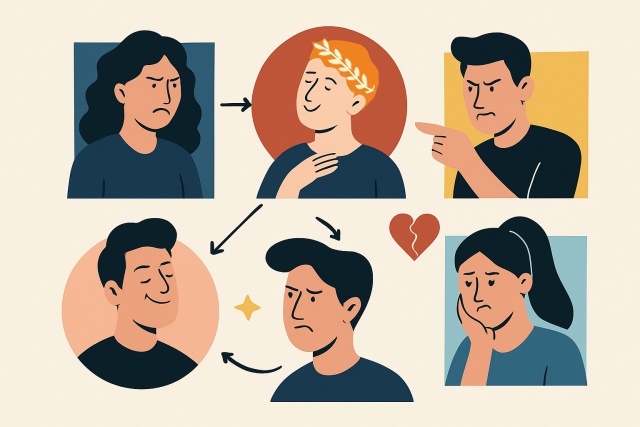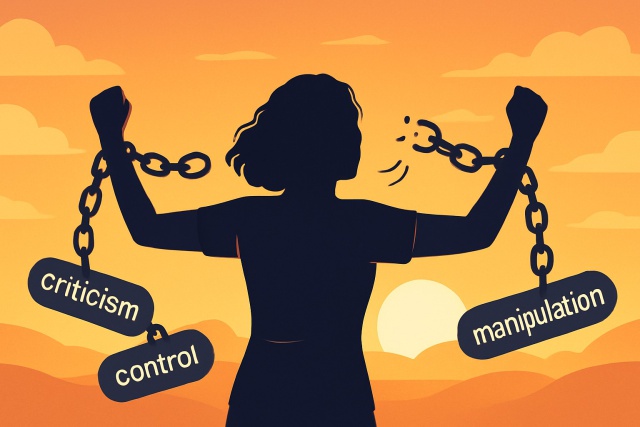
Recognizing Different Types of Narcissists And Their Traits
Narcissism comes in various forms, from overt arrogance to hidden insecurity. This guide breaks down...
A breakup marks the end of a romantic relationship, taking you through the stages of relationship breakup that usually stir up a tangled web of emotions which can really weigh on your emotional and psychological well-being.
Breaking up often feels a lot like going through grief, with emotional stages that can look quite different for each person but somehow tend to follow familiar patterns. Psychological ideas like the five stages of grief are frequently brought up to help make sense of the jumble of feelings people wrestle with during a breakup.
Understanding these stages really helps people brace themselves emotionally and gives their self-awareness and resilience a much-needed boost. When people know what typical reactions to expect, they often find it easier to come up with healthier ways to cope, feel less alone in the chaos and keep a clearer perspective when the breakup hits.
Denial often acts as the mind's first shield when the harsh truth of a breakup crashes in.
Managing denial usually calls for a bit of gentle self-reflection and some activities that quietly build your awareness—things like journaling about your feelings and the reality you are actually dealing with.
Anger often barges in when people feel betrayed, hurt or downright powerless. While it can definitely cause some damage if left unchecked, anger isn’t all bad — it can actually help individuals set clear boundaries and fuel personal growth.
Managing anger effectively often means catching yourself feeling it without judgment. It involves using exercise to shake off tension and finding creative or therapeutic outlets to release emotions.
Bargaining is the mind’s way of trying to grab the wheel again, negotiating either with itself or with the partner.
Accepting reality as tough as it can be usually helps stop the endless bargaining that drags out the healing process longer than necessary.
Bargaining winds down and a deep sadness often settles in hitting harder than you might expect. This stage can drag you into a heavy emotional slump, zap your motivation and make you want to retreat from others—all clear signs of how intense and personal the loss feels.
Taking care of yourself during this sensitive time usually means building a solid support network. This could be leaning on a few close friends who truly get you or working with mental health professionals who know their stuff. Therapy like counseling or cognitive-behavioral therapy often provides practical strategies to help manage depressive symptoms.

Acceptance is that pivotal moment when you finally come to terms with the reality of the breakup, no glossing over it anymore.
Moving forward is about setting personal goals that genuinely resonate with you, dabbling in new interests or hobbies that show off your unique flair and nurturing social connections that provide uplifting support.
The breakup process hinges on a few key factors—how long and deep the relationship was, the circumstances that led to the split, the personalities involved and the support systems they can lean on.
| Factor | Impact on Breakup Progression |
|---|---|
| Attachment Style | Secure attachment often acts like a sturdy anchor, helping people cope better, while anxious styles tend to drag things out with denial and that all-too-familiar bargaining dance |
| Communication Patterns | Open communication usually smooths the path to acceptance, but when communication falters, anger and confusion tend to crash the party |
| Length of Relationship | The longer the relationship, the heavier the heart feels—grief runs deeper and the gloom of depression tends to linger longer |
| Reason for Breakup | Sudden or traumatic breakups can hit like a ton of bricks emotionally, whereas slow, gradual separations tend to bring a more varied, though no less painful, set of emotions |
| Support System | Having a strong social and emotional support network generally nudges people towards quicker recovery and acceptance, proving that no one really gets through it alone |
Going through a breakup tends to get messier when you’re still in touch with your ex and juggling social media reminders. You also have to sort out practical stuff like co-parenting and navigate the tricky waters of mutual friends.
There’s a whole toolbox of resources to lean on when bouncing back from a breakup — things like various therapy approaches and supportive groups where you will not feel alone. There are also some highly recommended books and online platforms tailored to soothe those raw emotions.
Life’s twists and turns can really knock the wind out of your sails, especially after a breakup. But here’s the thing—those tough moments often plant the seeds for unexpected growth. It’s all about leaning into the discomfort, learning a bit more about yourself, and slowly piecing together something stronger and more resilient. So, while it might not feel like it at the time, this chapter could be the start of a surprising new journey—one where you come out wiser, kinder to yourself, and ready to embrace whatever comes next.
Knowing the stages of a relationship breakup can help people take the time they need to heal and build emotional resilience. They can eventually come out the other side stronger than before. Being aware of this often messy but natural process encourages personal growth.

Narcissism comes in various forms, from overt arrogance to hidden insecurity. This guide breaks down...

Intimacy disorder disrupts the ability to connect emotionally and physically, often causing confusio...

Insecurities impact relationships quietly but deeply. Learn about common types, how they develop, an...

Recognize common toxic relationship signs early to protect your emotional well-being and foster heal...